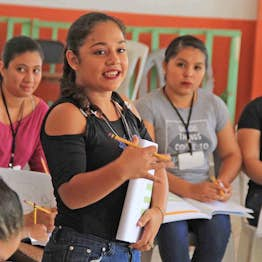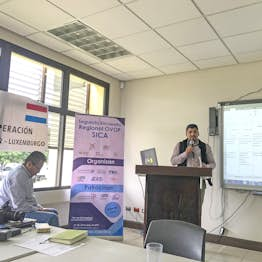Introduction
Development cooperation relations between Luxembourg and El Salvador began in 1993, as part of efforts to rebuild the country following the civil war. El Salvador had the status of Luxembourg’s Development Cooperation priority partner country until 2015, and recent progress in development has made it possible to commence a new innovative and inclusive partnership approach.
Read more
The year 2019 saw the continuation of the main bilateral projects in the area of development cooperation, in close collaboration with the new government of President Bukele, who took up his post in June 2019. Luxembourg’s development aid has focused on three key areas, through innovative projects targeting:
- support for the El Salvador government’s social policy,
- support for civil society via the ‘Fondo Concursable’ managed by the El Salvador government, and
- support for South-South and triangular cooperation.
In 2019, Luxembourg’s Development Cooperation reiterated its support for the NGO FUNDE, a long-standing partner, in the area of fiscal transparency and combating corruption. In addition, the ATTF/House of Training continued to provide training to finance sector professionals, in particular on issues concerning compliance and international financial reporting standards (IFRS). Luxembourg also provided EUR 250,000 in co-financing for the multi-dimensional country review in El Salvador, carried out by the OECD Development Centre.
Luxembourg continued its support for the Central American Integration System (SICA), based in San Salvador and of which El Salvador is a member country, particularly for a regional project for female entrepreneurs with the Centre for the promotion of micro and small business in Central America (CENPROMYPE). This key project is dedicated to equality between men and women and the promotion of women’s economic rights. Luxembourg has also supported a regional project for political, economic and social inclusion and participation by vulnerable groups (indigenous people and young people) with the General Secretariat of SICA.
In 2019, one NGO was active in El Salvador, continuing the implementation of two projects co-financed by Luxembourg’s Development Cooperation, with a multiannual budget of EUR 256,503.56.
Priority areas of intervention
- Decent work and economic growth
- Reduced inequalities
- Climate action
Reference data
- Population: 6,453,553
- GNI (per resident): USD 4,000
- Human Development Index (HDI): 124/189
- Life expectancy: 73
- Indicative Cooperation Programme: project country
Key achievements 2019
- Through the fund for calls for proposals for El Salvadorean civil society organisations (Fondo concursable) and the important work of five NGOs in the villages, hundreds of young people have been given access to education and jobs (in catering, beauty and mechanics).
- The El Salvador South-South and triangular cooperation fund (FOSAL) has positioned itself as a genuinely innovative instrument at the regional level, particularly in the area of capacity-building for national institutions and diplomatic relations with other countries in the region.
- Through the regional project with the Secretariat General of SICA, indigenous people and young people have participated in political, economic and social decision-making over the last two years.

